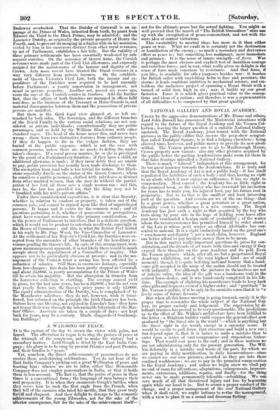A WAR-SONG OF PEACE.
IT is the custom of the day to crown the victor with palm, not laurel. The affectation in vogue is to ring the praises of peace at the triumph of the conqueror, and to make his victory but a secondary matter. Lord Gough is feted by the East India Com- pany ; his glory is to be sung by present Premier and past Premier, and their burden is "peace." Yet, somehow, the direct achievements of peacemakers do not receive these soul-stirring celebrations. You do not hear of the East India Company's picking out a great Wellington of peace and feasting him : whence we are to infer, either that Honourable Company does not employ peacemakers in India, or that it holds them in less account. The fact is, that the praise of peace in these limes is a conventional form ; the language of men betrays their real propensity. It is when they enumerate Gough's battles, when they recite how he took the first eagle from the French, when they tell of the enemies who tried his mettle, that they grow truly fervid and eloquent. And they deft to diverge to the romantic achievements of the young EdwaHes, not for the sake of the ulterior consequence, but for the sake of the achievement itself—
not for the ultimate peace but the actual fighting. You might as well pretend that the march of " The British Grenadiers " stirs one up with the excogitation of peace-concomitant, and not with the mere idea of contest victorious.
This excitability to martial ideas has more in it than either peace or war. IN hat we exult in is certainly not the destruction or humiliation of the enemy,—as much a secondary and derivative effect as peace is ; but something less malignant, more immediate and primary. It is the sense of innate strength—of force. War is perhaps the most obvious and explicit test of dauntless courage and resistless force ; and in war, what really gives us delight is the sense of force made conscious by resistance. And that force, if you like, is available for other purposes besides war : it teaches the British sailor with unyielding helm to face and penetrate the storm ; it lends confident ambition to mechanical science, and em- boldens the audacious project of spanning a Menai Strait with a tunnel of solid iron high in air ; nay, it builds up our great factories. Force it is which gives practical value to the concep. lions and ideas of a nation; and therefore is war a representative of all difficulties to be conquered by that great quality.


























 Previous page
Previous page